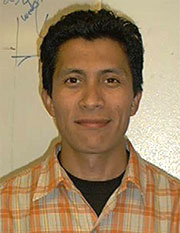Education and language use
Valerio had not studied English before coming to the U.S. in late 2002. As is the case with other immigrant-learners of English, reports from the in-home interviews show how Valerio's goals for education adjusted to changes in life situations and his understanding of his new environment. He started in ‘level B' (SPL level 2-3) and progressed to ‘level D' (SPL level 5-7).
He had 12 years of formal education in Mexico. As is the case with other immigrant-learners of English, with Valerio, we see in reports from his in-home interviews how goals for education change with changes in life situations and one's understanding of one's environment. After nine months in the U.S. (July, 2003), Valerio reported wanting to attend graduate school in the U.S. The following year (July, 2004), that goal had changed to obtaining a two-year degree from a community college. Two months after reporting that in an interview, Valerio had to interrupt his English language study to start a tax preparation class as reported in this letter to his teacher from the fall term of 2004 (Click to View).
The following summer (August, 2005), just before resuming his formal study of English, Valerio reported that he wanted to get a Bachelor's degree and become a citizen.
Language use
As is the case with many speakers of Spanish, Valerio reports that his primary language both inside and outside the home is Spanish. His wife is interested in improving her Spanish and she speaks with him and the children in Spanish. Valerio expressed a bit of frustration that his wife does not help him more with his English learning. Valerio uses what his in-laws' say about the situation as well to support his position. He says that his in-laws agree with him that Valerio's wife should be providing more support for his English learning.
In an in-home interview from July, 2004, Valerio talked about how his ESL class provided him a sheltered opportunity to use English.
| IR: | Yeah uh have you learned a lot of English in this last year? | |
| Valerio: | Is good. Is good. I am I like the class in in ESL because uh the teachers are that's that's very very good. The class is interesting for me because eh the eh teachers she don't she don't like its em sit down people together with the the same language. Is different language always. Is little compla- complicate when I talk to the friends eh Japanese or Koreans eh because, for me, not for all, is a little hard. All I don't understand all things. Sometimes yes sometimes no. But I like it I like it em different culture, different people, and different world. And I never have idea where now I study English when the people no speak Spanish only speak different language except Spanish. So is for me is is good. I like it. | |
| Hide Conversation | ||
While the workplace can offer learners a place to use English, that was the case to a very limited extent for Valerio. The job that he had in 2005 and 2006 provided a bit of an opportunity for English language use because his supervisor did not speak Spanish. But the opportunity for English language use was very limited "short times only" as he said. He described the custodial work he did as fairly solitary, each person on the crew working in different parts of a large building.
| IR: | What do you think helps you learn more English? At the school or at your work? | |
| Valerio: | ((nods)) Only at the school. S- | |
| IR: | What about your job? How is the environment there? | |
| Valerio: | Ahm in my job ah I speak little bit English because now my partners uh is from America but the nec- but before he's from Mexico so only speak Spanish but now yeah no problem I I like speak English with my friends but no is (+) be eh the conversation no is no is long time because is sh- short time. Short times only is speaks English. | |
| Hide Conversation | ||
